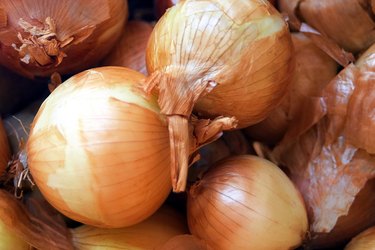
Onion powder is made from dehydrated onions, giving it a concentrated flavor that pairs well with many foods. Using onion powder when cooking offers health benefits because it contains some nutrients, but in small amounts, meaning you can't rely on it to meet your daily recommended totals. Look for onion powder in the spice aisle of your supermarket and be careful not to confuse it with onion salt.
Low In Sodium
Video of the Day
Onion powder has an intense flavor, but is very low in salt, with just 2 mg per teaspoon. This makes it a good substitute for salt in many recipes, including burgers, salads and soups. The daily recommended intake for sodium is no more than 2,300 mg, a number that many Americans exceed. Cutting back on salt by using onion powder when cooking can help reduce your risk of developing high blood pressure, heart disease and stroke.
Video of the Day
Calcium
Calcium is a nutrient that your body needs for strong bones and teeth, but also plays a role in nerve transmission and healthy functioning of your muscles. A teaspoon of onion powder contains 9 mg of calcium. With daily intake recommendations being between 1,000 and 1,200 mg, this number may not seem like a lot, but adding onion powder to your favorite dishes can increase your intake without much effort.
Low In Fat and Calories
Using onion powder in your favorite recipes ramps up the flavor without adding a significant amount of fat and calories. Keeping your diet moderate in both allows you to control your weight, which reduces the risk of several health conditions, including heart disease and diabetes. A teaspoon of onion powder contains just eight calories and virtually no fat, allowing you to use as much as you like without hindering your health goals.
Potassium
A teaspoon of onion powder contains 24 mg of potassium, a nutrient that helps to regulate blood pressure. Healthy muscle and bone contraction, digestion and heartbeat are other bodily functions that rely on an adequate intake of potassium. A deficiency in potassium could cause muscle spasms, irregular heartbeat and weakness, but adding onion powder to your spice cabinet is an easy way to increase your intake.
Magnesium
Onion powder contains a small amount of magnesium, with 3 mg per teaspoon. It contributes to bone health, immunity, muscle and nerve function and aids in regulating blood sugar. Magnesium is found in several vegetables and fish; adding onion powder when you cook them will add a little extra magnesium to your meal.
- USDA Database: Spices, Onion Powder
- Joy Bauer: Health Benefits of Herbs and Spices
- Office of Dietary Supplements: Calcium
- Office of Dietary Supplements: Magnesium
- University of Maryland Medical Center; Potassium; Steven D. Erhlich, NMD; May 2009
- Mayo Clinic: End the Guesswork With These Nutrition Guidelines; February 2011